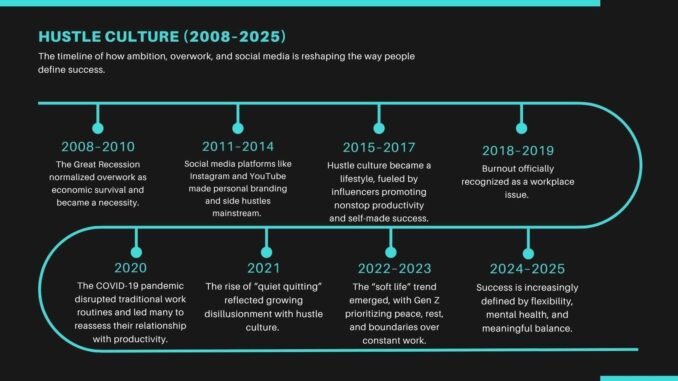
By Kimora Wong Sing, The Monitor
Twenty-two-year-old Jamannie Morgan wakes up early to brainstorm content, send emails and push creative projects, all before class. The Morgan State senior says he often sacrifices sleep and health just to keep up.
“Sometimes it feels like you’re working just to prove you’re trying,” he said.
For many Gen Zers, born between 1997 and 2012, the pressure to be productive and monetize hobbies is reshaping how they view work, rest and success. Hustle culture, once seen as ambition, now feels like burnout waiting to happen.
Hustle culture glorifies constant productivity, side gigs and self-sacrifice, a Forbes Business Council post says. Once praised as ambition, it now takes a mental and physical toll, leading Gen Z to question whether the grind is worth the emotional cost. Some say they feel burned out before they even enter the workforce.
“I’m always tired,” said Malik Thompson, a shift manager at Bloomingdale’s. “With how expensive everything is, hustling feels like the only way to stay afloat.”
Others say hustle culture isn’t about ambition anymore—it’s about survival.
“People get comfortable,” said Isaiah Nisbett, a 21-year-old security supervisor. “Time doesn’t wait. You have to take control.”
There are also many in Gen Z who say hustle culture isn’t just always about ambition but has now blended with the need for some to always grind for monetary survival. They don’t believe in “sob” stories. Everyone has one. What matters is how you push forward.
Nisbett stated that he doesn’t have strong feelings about the direction of hustle culture because he feels that if it leads to a successful future, it can be worth it.
“You gotta want better for yourself and your family,” Nisbett said. “Everyone has a story, but at some point, you have to take control.”
Feeling guilty for taking breaks
While mental health breaks are often encouraged, younger generations struggle with the idea. Isaac Davis Jr., a computer engineering student at Howard University, said taking a break doesn’t feel like an option.
“Even resting feels like I’m falling behind,” Davis said.
Nusi Addae, a senior at Morgan State University, added, “I’m in class Monday through Friday, then work weekends to support myself. It’s hard to rest without feeling guilty or like I’m slacking.”
Social media often intensifies these feelings as people scroll through curated images of productivity and perfection. Many people find it hard not to compare their lives to those of influencers or peers who seem to have it made.
“Everyone looks successful online,” said Jared Still, a recent graduate of Morgan State. “You don’t see the skipped meals or late nights, just the Instagram highlights. But comparison is the thief of joy.”
Older generations say that Gen Z experiences hustle culture differently. The blending of work, identity and online life creates new pressures they didn’t face.
“To us, hustle meant doing what was necessary, not proving it constantly,” said Angela Reed, a millennial project manager.
Carlos Jennings, a retired electrician, added, “You worked, saved money and minded your business.”
Mental health professionals warn of the long-term cost of burnout. Dr. Erin Burke, who works in adolescent medicine at Mount Sinai Health Center, said relentless hustle culture affects emotional regulation and increases stress.
“Rest must be normalized as essential, not seen as a weakness,” Burke said.
Some Gen Zers are pushing back by embracing online movements like “quiet quitting” and “soft life,” which promote peace over relentless productivity.
“Choosing peace over productivity isn’t laziness,” said Dr. Audrey M. Walker, a psychiatrist at Montefiore Einstein Medical Center.
Davis said he’s learning to protect rest the same way he protects his work.
“I treat it like a reset,” he said. “When I don’t rest, my performance suffers.”
Still said balance is something he’s learning to practice, and it’s not yet perfect.
“Even when I’m relaxing, I feel like I should be doing something,” he said. “I’m learning that balance means knowing what can wait.”
Technology makes the struggle harder. The constant connection makes it difficult to truly log off.
“When we clocked out, we clocked out,” said Reed, the millennial project manager. “Now people reply to emails late at night or edit content after hours. There’s no off switch.”
She added, “But I admire how open Gen Z is about therapy, burnout and mental health. They’re tackling issues we never talked about out loud.”
Older generations also believe Gen Z’s awareness could spark broader change.
“They’re confronting hustle culture’s downsides sooner,” Reed said. “That could lead to a more sustainable future.”
Still recalled a moment with his niece that shifted his perspective. “She said, ‘You’re always at work.’ That hit me,” he said. “I don’t want to miss the moments that matter.”
For many young adults, success is shifting from wealth and prestige to peace and purpose.
“I used to think success was about money and fame,” Davis said. “Now it’s about consistency and doing what really matters.”
Educate yourself
Against it: https://www.talkspace.com/blog/hustle-culture/
For it: https://www.rockandart.org/hustle-culture-well-being-productivity/

Be the first to comment